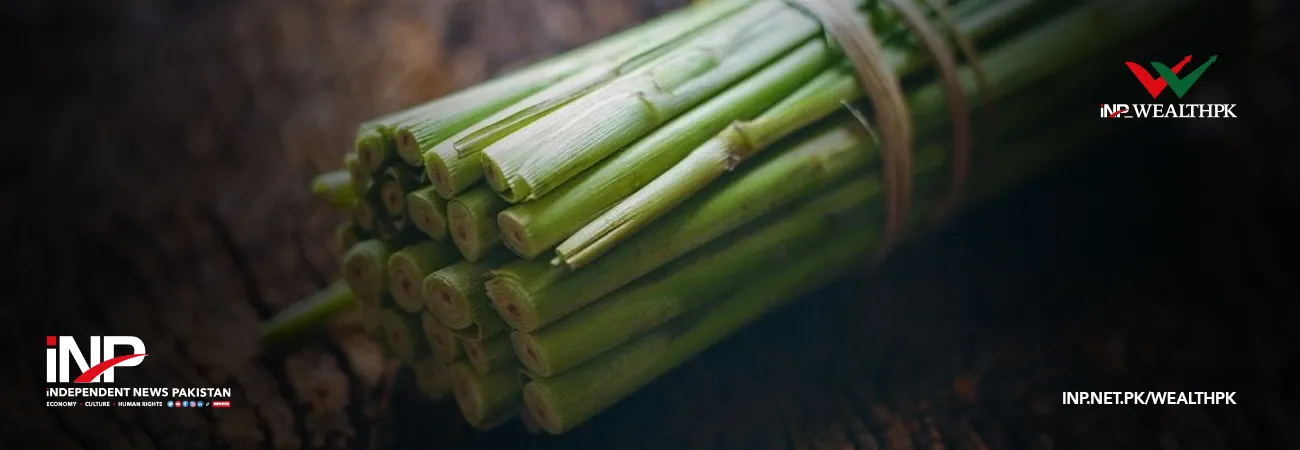INP-WealthPk
Faiza Tehseen
By promoting the indigenous cultivation of lemongrass and its value addition, Pakistan can save millions of dollars spent on importing black tea to satisfy the people’s tastes. “Lemongrass tea is not only beneficial for human health, it is also an essential oil used in a variety of industries,” pointed out Naveed Ahmad, Assistant Director of the Directorate of Floriculture, Punjab. Talking to WealthPK, he said according to a report published by the Statistical Bureau of Pakistan, Pakistan spent $556 million on the import of 231,449 metric tonnes of tea during the fiscal year 2022-23. He emphasised that it was important to create awareness among the farmers about the value of different grasses/herbal plants. He said lemongrass oil’s price in the local market was about Rs15,000 per litre. Ahmad called for promoting corporate farming of valuable plants, grasses and herbs in the country. He said though the government was promoting cluster farming of lemongrass and other herbal plants, much needed to be done to fully tap the potential of the plant. He said lemongrass nourished in tropical/mild tropical areas.
“The environment in the Punjab province is suitable for cultivating it. However, it can also be grown in other parts of the country, where the weather is not that severe. The grass is mostly planted in March and harvested in October. The ready crop is cut by leaving three to four inches of stem, so it sprouts again. It is a perennial herb and lasts for at least four to five years.” The Punjab Directorate of Floriculture official further said different varieties were grown in Pakistan, including Jammu lemongrass, East Indian lemongrass and West Indian lemongrass. He said the Jammu lemongrass was white stemmed, resistant to frost and dwarf-sized. “Oil content in the herb is 0.3-0.7%, while its essential contains 75-80% citral, and it has medium alcoholic solubility.” The official maintained that the East Indian lemongrass had two varieties based on stem colour. “One variety is also called the cochin/Malabar grass. It is a tufted vigorous perennial grass about two meters in height. It is also called the true lemongrass with stem and leaf sheath reddish/purple in colour.
Its essential oil contains more than 75-80% citral, has good solubility in alcohol, and superior quality.” He said the other variety was identified by its white-coloured stem and was a wild variety. “Its essential oil contains citral less than 65-70%, has poor solubility in alcohol and is considered inferior in quality.” Ahmad maintained that the West Indian lemongrass was also called the American lemongrass. “It is stemless and perennial grass. Its essential oil contains 74-76% citral and shows poor solubility. It is more typically used for cooking and its scent resembles the fragrance of lemon.” He said the citrus-like fragrance and remedial properties of lemongrass made it ideal for multiple industrial purposes, including pharma industry. “It is used as an anti-pathogen agent and is a powerful mosquito repellent.” He said lemongrass tea was best for health when brewed and not boiled on high flame. He said Pakistan could become one of the largest producers of lemongrass products, like China and India, if the government set up lemongrass value-addition units and market it globally.
Discussing the best methods to extract lemongrass essential oil, Dr Riffat Tahira, a principal scientific officer and programme leader of National Medicinal, Aromatic Plants and Herbs of Pakistan Agricultural Research Council (PARC), told WealthPK that boosting lemongrass cultivation was important for the country’s agriculture sector. “This grass is beneficial for both medicinal and culinary purposes. The best method to extract its oil is through steam distillation, though the hydro distillation method is equally good. But all the best compounds, including citral, can only be extracted through steam distillation.” She also called for conducting awareness campaigns to highlight the importance of valuable plants, herbs and shrubs in the country.
Credit: INP-WealthPk













